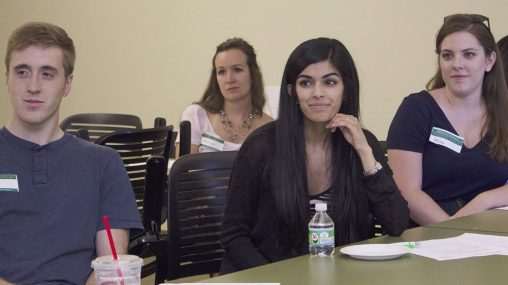
Wright State’s MCAT prep course provides a structured group-study setting that includes instruction and mentorship by the medical and pre-med students.
For aspiring physicians, success on the Medical College Admission Test (MCAT) is a crucial part of getting into medical school. But preparing for the test through commercial prep courses can be very expensive and out of reach for many students.
For the past eight years, the Wright State University College of Science and Mathematics has offered an MCAT prep course that is far less expensive than some of those commercial platforms, using medical students at the Boonshoft School of Medicine and pre-med students as teachers. And its success rate is high.
“It is very much a labor of love, as the teachers give back and help the success of other students,” said Kathrin Engisch, dean of the College of Science and Mathematics.
The MCAT is a computer-based standardized examination for prospective medical students. It is designed to assess problem-solving, critical thinking, written analysis and knowledge of scientific concepts and principles.
“The Medical College Admissions Test is a humbling exam covering an extensive amount of material,” said Rob Cowles, prep course manager and coordinator of Wright State’s Pre-Professional Health Program. “To be successful on the MCAT, each student must dedicate time for self-study and review.”
Registration fees for commercial MCAT prep courses can range from $2,000 to $3,000, an expense that can leave out many Wright State and other students.
In 2013, the Pre-Professional Health Program began offering the prep course to Wright State students and students from other local colleges and universities. The course, which costs $650, provides a structured group-study setting that includes instruction and mentorship by the medical and pre-med students.
Cowles said the course prepares students to logically apply concepts already learned in past science courses to the MCAT exam and teaches them how to approach MCAT-style questions and the testing environment. It also provides a review of MCAT exam content to help students identify areas of weakness and determine which areas to study independently.
“Academic performance, including the MCAT, is one of the most critical factors in getting an interview invite to medical schools,” said Cowles, adding that the MCAT ranks behind only cumulative science grade point average and cumulative grade point average in importance. “Students must dedicate time and energy to this critical portion of the application.”
The MCAT is the only part of the medical school application that is standard, enabling medical schools to compare applicants by using a single metric that is the same no matter the school, research or personal experiences.
Since the inception of Wright State’s prep course, 29 students on average have registered for the course yearly. Nearly half of them register for and complete the MCAT, with 80% of that group applying to medical school and 65% being accepted, a number that greatly exceeds the 42% national average.
“The data appears to indicate that students taking the course have a higher likelihood of being accepted to medical school than those who do not take the course,” said Cowles.
Catherine Evers Smith completed the course and was accepted into medical school.
“For me the course was very helpful in that it provided structure and support to my study time,” she said. “Since it included MCAT study books, practice exams and lectures, it was a great set of resources for a reasonable price.”
The course is held each Spring Semester, from January through April on Monday and Friday from 6 to 9 p.m. The registration fee pays for nearly 70 hours of instruction covering the six-sections of the MCAT exam and includes three, full-length practice exams.
The funds are used to purchase additional resources for Pre-Professional Health students such as practice tests, study books, chemistry kits and review sessions. The money also supports Wright State’s annual Path to Health Professions event, a day of informational forums exposing students and future students to the health professions.
Learn more at science-math.wright.edu/pre-health-program/mcat-prep-course.

 Wright State psychology team studies ways to identify fatigue in pilots, drivers
Wright State psychology team studies ways to identify fatigue in pilots, drivers  Wright State videographer Kris Sproles wins Regional Emmy and Ohio journalism award
Wright State videographer Kris Sproles wins Regional Emmy and Ohio journalism award  Wright State Boonshoft School of Medicine ranked among the nation’s best for 2024 by U.S. News
Wright State Boonshoft School of Medicine ranked among the nation’s best for 2024 by U.S. News  Exposing biotechnology
Exposing biotechnology  Wright State faculty member Dan Noel uses unique background to inspire new leaders
Wright State faculty member Dan Noel uses unique background to inspire new leaders 